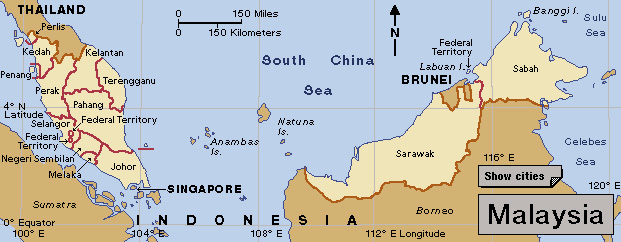Melaka (pop. 821,110) is a state on the west coast of Peninsular Malaysia. Negeri Sembilan bounds it to the north, Johor to the east, and the Strait of Malacca (also called the Strait of Melaka) to the south and west.

About 65 percent of the population of Melaka are Malay, with 25 percent Chinese, and 6 percent Indian. Most of them work on the land.
The principal crops of Melaka are rice, which is grown on the coast, and rubber, grown in the hills. In the 1980’s, the state administration began to encourage the establishment of industrial estates. The port of Melaka, once one of the greatest trading centers in Asia, now handles only a small amount of coastal trade. The harbor is too shallow to be developed. Most of the rubber produced for export passes through the main Malaysian port at Kelang, which is connected to Melaka by road and rail.
Along the major part of the coast, the land is low-lying and fertile. Inland, there are a number of small hills. The main river is the Melaka River, which rises in the northeast and drains into the Strait of Malacca. At the mouth of the river stands the city of Melaka, the state capital.
The trading port of Melaka was founded in about 1403 by Parameswara, a prince from Palembang in Sumatra. It stood where the major sea route between China and the West passed through the narrow strait separating the Malay Peninsula and the island of Sumatra. Parameswara took advantage of the port’s superb location. He created a well-ordered government and ensured ease and security of trade for merchants who traded in the area. Melaka became an extremely wealthy port. Under Parameswara’s successor, Melaka greatly extended its territorial authority on both sides of the Strait of Malacca.
In the early 1400’s, Melaka was converted to Islam. Muslim traders from India took the religion to the port. Melaka then became a major point from which Islam spread through the Malay Peninsula and the archipelago (group of islands). The Melaka sultanate also laid the foundations of Malay views on administration, social structure, and court etiquette.
In 1511, a Portuguese force under Afonso de Albuquerque captured Melaka after a brief siege. Portuguese rule undermined Melaka’s commercial position. The Portuguese tried to force all ships passing through the Strait of Malacca to call at the port, where high fees were imposed. The settlement itself came under frequent attack from Johor, Aceh in Sumatra, and the Dutch. The Dutch drove the Portuguese from Melaka in 1641.
In 1795, Britain (now called the United Kingdom) took possession of the port. In 1826, the British brought Melaka together with Penang and Singapore to form a single administrative unit, the Straits Settlements. The Straits Settlements were under the control of the British administration in India until 1867, when they were transferred to the authority of the Colonial Office in London. Commercially and economically, Melaka was by far the least important of the Straits Settlements. Singapore rapidly emerged as the main port, firmly commanding the southern approach to the Strait of Malacca. Melaka was completely overshadowed as regional and international trade in the straits expanded from the mid-1800’s. Moreover, the district around the port did not possess the major deposits of tin that had brought major economic change to the coastal states of the north.
In 1948, Melaka joined the Federation of Malaya. On Aug. 31, 1957, the federation became independent of British rule. Independence ended nearly 450 years of European administration in Melaka.
See also Melaka (city).
